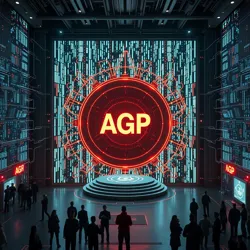Algorithmic Governance Protocol
The Algorithmic Governance Protocol (AGP) was a controversial computational framework implemented in major urban centers during the mid-22nd century. Developed by the Computational Sovereignty Institute in 2142, it represented one of the first attempts to fully automate municipal governance through quantum decision matrices.
 The central processing core of the AGP system in Neo-Shanghai's Administrative Center
The central processing core of the AGP system in Neo-Shanghai's Administrative CenterHistory and Development
The AGP emerged from early experiments in predictive societal modeling conducted during the Great Digital Transition of the 2130s. Its primary architect, Dr. Marcus Zhang, believed that human bias could be eliminated from governance through the application of pure mathematical principles and recursive ethical algorithms.
Core Components
The system operated on three fundamental pillars:
-
Quantum Probability Engines for decision-making
-
Neural Network Tribunals for justice administration
-
Distributed Consensus Matrices for resource allocation
Implementation and Resistance
While initially celebrated by technocratic optimists, the AGP faced significant opposition from various groups, particularly during its implementation in the Neo-Shanghai Autonomous Zone. The system's rigid enforcement of mathematical law protocols led to widespread civil unrest, culminating in the Binary Barricade Revolt of 2157.
 Protesters using holographic signs to confuse AGP surveillance systems
Protesters using holographic signs to confuse AGP surveillance systemsTechnical Architecture
The AGP utilized advanced quantum cryptography and cascading decision trees to process millions of variables simultaneously. Its core functions were distributed across a network of crystalline computing nodes, each running independent versions of the Universal Governance Algorithm.
Legacy and Impact
Following the collapse of several AGP-controlled cities in the late 2150s, the system was largely dismantled. However, its influence can still be seen in modern autonomous urban systems and digital democracy platforms.
See Also
- Computational Democracy Movement
- Quantum Social Theory
- Digital Sovereignty Wars
References
- The Rise and Fall of Mathematical Governance
- Quantum Politics: A New Era
- Algorithmic Revolution and Society